
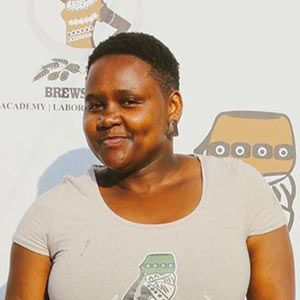
Apiwe Nxusani-Mawela is South Africa's first black brewster and owner of Brewsters Craft, a company offering contract brewing, consulting, training and a laboratory facility.
Beer, one of the oldest and most widely consumed alcoholic drinks in the world, is big business. Regrettably, modern brewing is an industry almost completely dominated by men. This is set to change as Apiwe Nxusani-Mawela, armed with an Afrocentric mind-set courtesy of Unisa’s Thabo Mbeki African Leadership Institute (TMALI), blazes a trail for black women in this ancient craft.
A BSc Honours graduate in Microbiology and Biotechnology, Nxusani-Mawela’s unique Africa-centredness sets her apart from her peers. "In everything I do within my company or within the industry, I ask myself whether it advances the African brewing sector," she says. "Does it showcase to the world what Africa is capable of? Will it lead to the long-term sustainability of the African brewing industry?"
Nxusani-Mawela is South Africa’s first black brewster (ie female brewer) and owner of Brewsters Craft, a company offering contract brewing, consulting, training and a laboratory facility. She says her interest in brewing started when she attended an open day at the University of Johannesburg and was fascinated by the study of biotechnology. "Beer brewing is essentially a biotechnological process," she explains.
Nxusani-Mawela is fully immersed in the industry. She serves as the chairperson of both the Africa Section of the Institute of Brewing and Distilling and the Beer Association of South Africa. She also serves on the board of directors for the Craft Brewers Association of South Africa. Through these key roles she has been able to advance brewing qualifications, especially for black women, across the African continent.
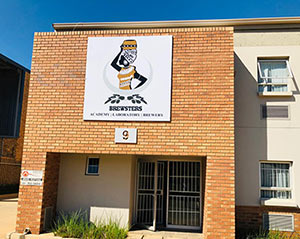 After leaving South African Breweries (SAB) in 2015, Nxusani-Mawela went into a partnership to start Brewhogs microbrewery in Kyalami, which she ran as a brewmaster (or, to be more accurate, brewmistress). She then started her own company, Brewsters Craft, where she initially focused on offering training and consultation. "Next, I decided to add on a brewing facility and offer brewing services for brewsters," she says. "The company’s academy is accredited by the FoodBev SETA to offer NQF3 brewing qualifications and learnerships. They are also accredited with the Institute of Brewing and Distilling to offer training towards the General Certificate in Brewing and Diploma in Brewing."
After leaving South African Breweries (SAB) in 2015, Nxusani-Mawela went into a partnership to start Brewhogs microbrewery in Kyalami, which she ran as a brewmaster (or, to be more accurate, brewmistress). She then started her own company, Brewsters Craft, where she initially focused on offering training and consultation. "Next, I decided to add on a brewing facility and offer brewing services for brewsters," she says. "The company’s academy is accredited by the FoodBev SETA to offer NQF3 brewing qualifications and learnerships. They are also accredited with the Institute of Brewing and Distilling to offer training towards the General Certificate in Brewing and Diploma in Brewing."
In 2017, Nxusani-Mawela completed a TMALI short course on thought leadership for Africa’s renewal. The institute is a partnership between Unisa and the Thabo Mbeki Foundation. The principal purpose of TMALI is to train Africans for the political, economic, social and cultural renewal of the African continent and its people.
Nxusani-Mawela says that she found that the content of the TMALI course aligned with her company’s vision - to become a leading company within the African brewing sector and to showcase to the world what Africa has to offer. "In one of the assignments I had to prepare a speech to deliver at the African Union on five key decisions that need to be made in order for the African Renaissance to succeed," she says. "I included the five key things I believe should be changed within the brewing space in Africa. I am now working towards implementing some of those decisions in my company and within my space to bring about the African Renaissance."
 Apart from offering training, learnerships and internships in South Africa, Nxusani-Mawela has also been offering advice and training to brewsters who want to set up their own breweries across the continent.
Apart from offering training, learnerships and internships in South Africa, Nxusani-Mawela has also been offering advice and training to brewsters who want to set up their own breweries across the continent.
"In everything I do within my company and industry, I am mindful of advancing the African brewing sector and ensure its long-term sustainability," she says. "I believe this contribution shows many Africans that anything is possible and attainable, including Africans owning a brewery in Africa. I hope to see many small breweries across the continent brewing beers using local ingredients, celebrating the richness of Africa through the beers and creating much-needed employment."
"In terms of my profession, I am a brewster who happens to be a black female - I should be judged by my skills and not by other aspects," says Nxusani-Mawela.
The experience and knowledge gained over the years have earned her much respect within the industry. Nxusani-Mawela chooses to focus on the positives and lives by the motto "Be so good, they can’t ignore you".
She urges women to keep their heads high as no one can take away their knowledge just because they are women. She acknowledges that, unfortunately, women constantly have to prove their worth, but believes that should not bring them down.
"Our struggles today are paving a path for the next generation of women in our workspace, so they do not have to go through what we went or are going through," she concludes. "One day, having women in male-dominated fields will be the norm."
* By Nancy Legodi, Acting Journalist, Department of Institutional Advancement
This article first appeared in YOUNISA, Issue 1, 2020.
Publish date: 2020-08-12 00:00:00.0
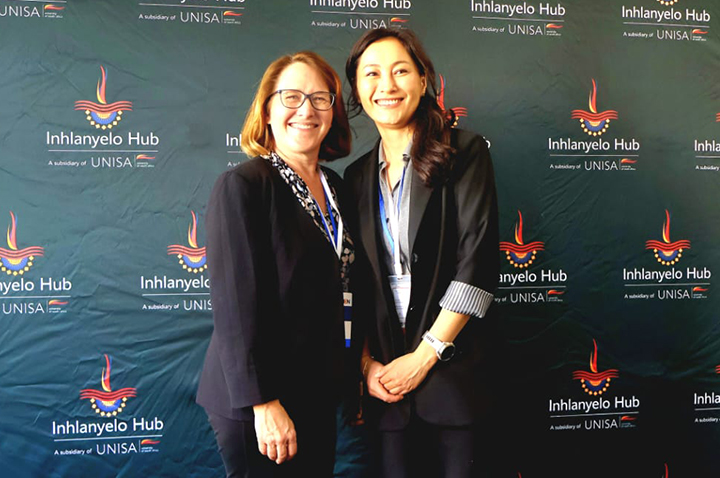 Unisa roundtable focuses on empowering SA women to lead in innovation
Unisa roundtable focuses on empowering SA women to lead in innovation
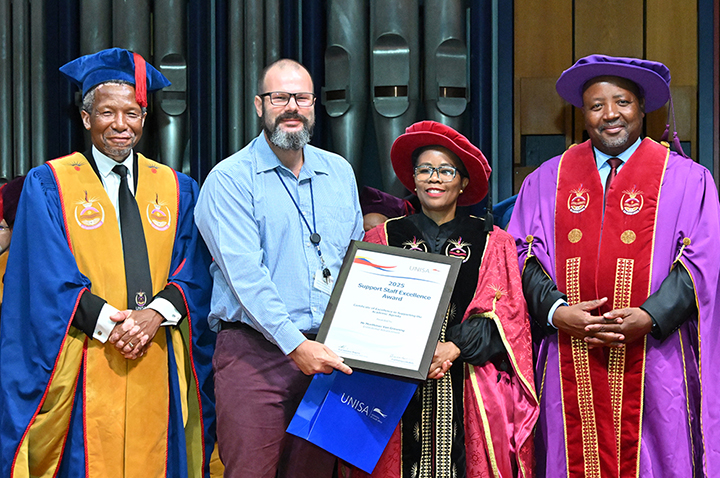 Unisan recognised for web excellence
Unisan recognised for web excellence
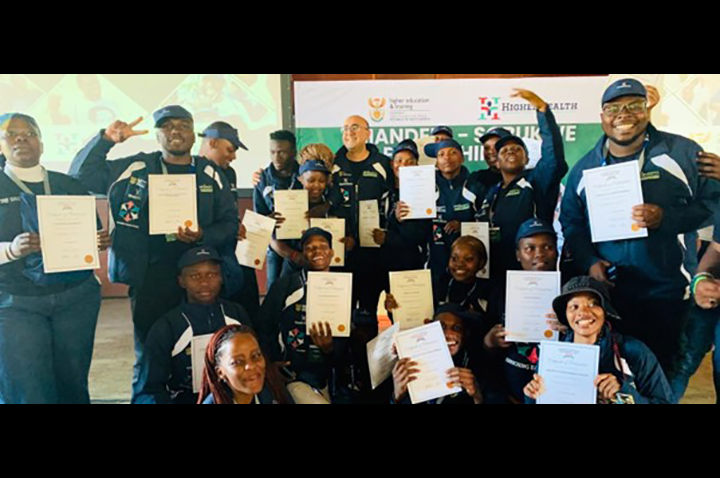 Office of the Dean of Students participates in leadership camp
Office of the Dean of Students participates in leadership camp
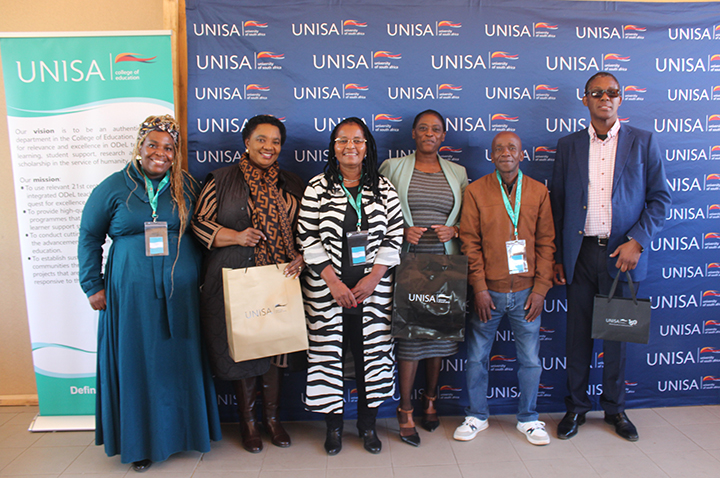 Unisa project fosters digital and pedagogical innovation in Limpopo schools
Unisa project fosters digital and pedagogical innovation in Limpopo schools
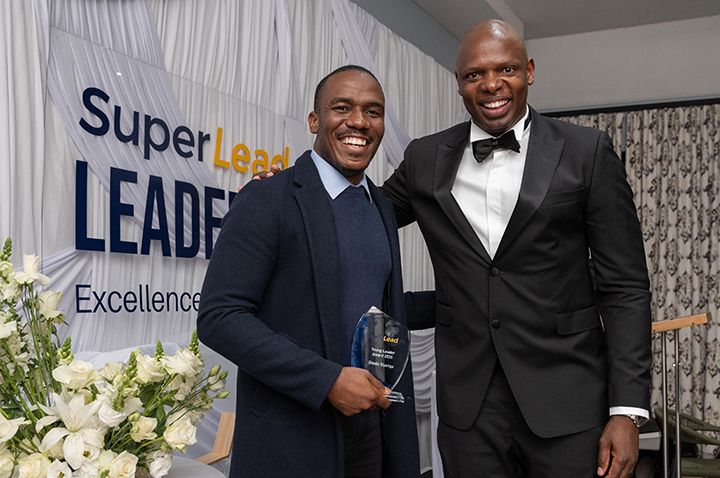 Unisa student wins prestigious national leadership award
Unisa student wins prestigious national leadership award